Introduction
Social media have become a convenient source for obtaining educational materials and information (Fernández-Luque & Bau, 2015; Grajales et al., 2014). Social media refer to the applications of networking sites to create and exchange information through blogs and microblogs (i.e., Twitter), content communities (YouTube), and social networking (i.e., Facebook and LinkedIn). Social media and online resources have affected most aspects of our lives; many use them to guide healthcare decision-making. With the emergence of the Internet, the world, especially from the perspective of communication, has advanced (Aiyende, et al., 2020). In past years, social media enabled the unrestricted sharing of information and knowledge distribution, including medical and healthcare information that patients could discover (Tan & Goonawardene, 2017).
The uses of social media are unlimited; some people use the mentioned platforms to receive medical consultations, while others use them to find information related to their conditions. Several studies have shown how technology has empowered individuals and changed their ways of seeking health-related information on the Internet (Salau, et al., 2020; Greenhalgh, et al., 2016; Laranjo et. al., 2015; Koster, et al., 2015; Kear, Harrington, Bhattacharya, 2015; Greaves, et al., 2013; Mackey, Liang & Strathdee (2013); Greene, et al., 2011). Social media provide informal channels for disease reporting; it also plays a vital role in connecting patients with similar health conditions, enabling them to discuss mutual concerns and solutions all over the world with others (Adelua et al., 2020). Patients take into consideration the comments of strangers when making medical decisions.
Today, many patients seek online advice from physicians they have never met. The advantage of an online medical consultation is that there are no geographic boundaries, as the patient can gain access to reputed physicians that are not usually available. Another advantage is the cost; online consultations are lower in price (Shepherd, Sanders, Doyle, Shaw, 2015; Albalawi & Sixsmith, 2014). However, this will not be suitable for many cases, where a physical examination is needed. While social media facilitate care and education, it could also create impending risks for patients and healthcare professionals. (James, et al., 2020; Zhang, et al., 2017; Sawesi, et. al., 2016; Smailhodzic, et al., 2016; Song, et al., 2016; Tonsaker, Bartlett & Trpkov 2014).
The distribution of poor-quality information can cause harm to patients and damage the professional image. Even though many as an influential factor in improving health and reducing costs saw patient engagement in social media, there is a considerably high risk of patients encountering misleading information (Tyrawski & DeAndrea, 2015). Extant literature shows that healthcare practitioners have reduced the potential harm caused by untrustworthy information retrieved from social media by sharing accurate knowledge and educating patients on reputable sites. (Fayemi, et al., 2020; Campbell, et al., 2016; Almaiman, et al., 2015; Bahkali, et al., 2015; Diviani, et al., 2015); Coulson, 2013) Another risk is the inappropriate exchange of online information or advice for in-person visits to a healthcare provider. Thus, the use of social media among patients is changing traditional information-seeking behaviours. This study aims to assess the use of social media platforms for obtaining healthcare information and describing their perceptions, attitudes, and practices. (Nejo, et al., 2020)
Statement of the Research Problem
Since the global target of “Health for All” was declared in 1978, primary health care (PHC) has been adopted universally and embraced as the path to achieving Millennium and Sustainable Development Goals. A primary healthcare programme is a grass-root approach designed to address critical community health challenges by offering preventive, restorative, and rehabilitative services (Hao & Gao 2017). Primary healthcare values underline the approach’s great importance. These principles, which include essential health care, community involvement, equity, inter-sectoral collaboration and appropriate technology, are the driving force behind the efficiency of primary health care in the hope of achieving universal health coverage.
By implication, this means that primary health care aims to provide services to most people based on needs without geographical, social or financial barriers, through their involvement in health program planning, implementation and evaluation. The World Health Organization (1991) agreed that healthcare information should be made available to the public in the mass channels they already learn and use, which means that the mass media can make a useful contribution to the dissemination of health messages to the general public. This situation raises the salient question of the benefits and use of social media platforms by health-seeking hospital patients in suburban primary healthcare centres. They should focus more on areas of public benefits such as more empowerment programs, educational programs and better community relations (Adelua et al., 2020a; Adelua et al., 2020b; James et al., 2020d; Nwosu et al., 2019; Adelua et al., 2020c; Adelua et al., 2020d; Aiyende et al., 2020a; Aiyende et al., 2020b; Fayemi et al., 2020a; Fayemi et al., 2020b; Fayemi et al., 2020c; Fayemi et al., 2020d; Olabanjo et al., 2020b; Omokiti et al., 2020a).
Research Objectives
- To evaluate the awareness of social media as reliable channels for seeking healthcare information by patients of three suburban primary healthcare centres in Yaba, Lagos, Nigeria.
- To assess the adoption of social media as a reliable channel for seeking healthcare information by patients of three suburban primary healthcare centres in Yaba, Lagos, Nigeria.
- To examine social media as reliable channels for seeking healthcare information by patients of three suburban primary healthcare centres in Yaba, Lagos, Nigeria.
- To investigate the perceived benefits of social media as reliable channels for seeking healthcare information by patients of three suburban primary healthcare centres in Yaba, Lagos, Nigeria.
Literature Review
Social Media
Social media are part of our society, which influence social norms and ideology (Abdulaziz, 2014; Antheunis, Tates & Nieboer, 2013). Sharing information and content is now a common desire (Albalawi & Sixsmith, 2015). They have changed how many people interact, communicate and socialize. This scenario implies that the social media platform has become gradually more popular as the central platform for small businesses worldwide. Adelua et al., (2020a) proposed that the impact of social media platforms as an electronic marketplace for business has become a critical issue in the industry and the literature on entrepreneurship (Odiboh et al., 2020a; Odiboh et al., 2020b; Odiboh and Oladunjoye, 2019; Odiboh and Ajayi, 2019; Odiboh, Ezenagu and Okuobeya, 2019).
According to Fernández-Luque and Bau (2015), social media are used as an alternative business tool so that small and medium enterprises (SMEs) can gain advantages such as engaging in a marketplace located far from their geographical area without necessitating physical presence. Nowadays, social media have been pervasive for businesses as tools for interacting directly with consumers, even reaching potential customers (Hao & Gao, 2017; Househ, Borycki & Kushniruk, 2014; Greaves, Pape & King, 2012).
Healthcare Information
Health information-seeking behaviour is now gradually gaining attention among the public worldwide, including in Nigeria (James et al., 2020a; Ndubueze et al., 2019; James et al., 2020b; James et al., 2020c; Ndubueze et al., 2020; Nejo et al., 2020a; Olabanjo et al., 2019). Health information-seeking behaviour also differs between each individual depending on the health issues one faces. Health information-seeking behaviour is “finding and receiving messages or information to minimize the health status-related confusion and build trust in the health context”. Healthcare information-pursuing action is, according to (Fayemi et al., 2020b), a pursuit that involves obtaining information about medical treatments, alternative medicine, diet and physical activities. A systematic review revealed that studies investigating healthcare information seeking in Nigeria are still low. The study of health information-seeking is relevant in the context of Nigerian society. Awareness of health information-seeking behaviour is imperative to public health (Nwosu et al., 2020a; Nejo et al., 2020b; Olabanjo et al., 2020a; Omokiti et al., 2020b; Salau et al., 2020a; Salau et al., 2020b; Nwosu et al., 2020b). But more importantly, it will impact people’s ability to self–manage their health (James, et al., 2020a). A recent study found that the Internet has become necessary for those who are health conscious and prefer to be more empowered to manage their health through authentic healthcare information from the Internet (Nejo et al., 2020b).
Social Media and Healthcare information
The adoption of the Internet has significantly changed the way healthcare information is considered. It is essential to understand the behavioural pattern of seeking health-related information on websites to identify their needs better. These highlight improvements are possible in the landscape of Internet healthcare information quality and availability (Aiyende et al., 2020a).
Methodology
This study is a cross-sectional investigation conducted between December 2019 and January 2020 at Yaba, Lagos State, Nigeria. The ethical approval for this study was obtained from the Ethical Review Board at Covenant University and conducted according to the underlying principles. The inclusion criteria consisted of patients in the waiting rooms of the outpatient clinics and their perceptions of health-seeking information via social media. The participants were literate (could read and write) and used the Internet regularly (daily). Those who did not meet the inclusion criteria did not participate. A self-administered 4-section questionnaire was adopted from the literature to assess the use of social media by patients seeking health information.
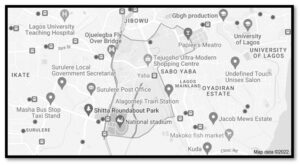
Fig. 1: A map of the Yaba suburb of Lagos, Nigeria.
Source: Google
Two hundred and sixty respondents filled out a questionnaire based on the online sample size calculator Raosoft, and a 95 % confidence interval, which is an assumed 50 % prevalence of patients using social media for medical information. The self-administered questionnaire was developed in English and modified by the researcher(s) to fulfil this study’s purpose and assure validity. Two experts reviewed the items in the questionnaire: a social media expert and a supervisor. For the reliability of the instrument, Cronbach’s alpha of the survey for section B (perception) was 0.811, section C (awareness) was 0.792, and section D (usage) was 0.758.
The questionnaire consisted of 4 sections with a total of 20 questions measured by “yes”, “no”, and, “don’t know” choices. Four questions were used in the third section to assess their awareness of healthcare information through social media. Likert scales (4- and 5-point) were the perceptions and usage questions. Patients of three primary healthcare centres answered the questions posed by the research instrument.
The questionnaire consisted of two parts: 1. The first part was concerned with demographic data including age, gender and education. 2. The second part of the questionnaire included the following items: a. They were using the Internet/social media for general health-related reasons. b. Public sources to get oral health information. c. Use of social media to collect or share data about healthcare. d. Benefits of using social media to access healthcare information as the primary source. e. Perception of using social media to obtain health information. f. Most topics the respondents searched/viewed through social media are related to general healthcare. For the data analysis, frequency distribution shows the demographic characteristics of the participants.
Data Analysis and Presentation
Only 221 patients completed the questionnaire. Out of the total population of 260 patients found at the hospices during the survey, 29% were males, and 71% were females. The ages of respondents ranged from 18 to 50 years with a mean age of 30.5 (33.5) years filled in the questionnaires. Approximately 81 (37.6%) of the respondents were single, while 125 (56%) were married and only 15 (7%) were others such as widows, divorced, separated, etc. Nearly 42% of the respondents had completed at least a university education (see Table 1). Regarding their profession/employment status, 114 (52%) respondents reported that they are employed; 82 (37%) were self-employed, and only 25 (11%) were employed. The demographic information summary of the participants is in Table 1.
Table 1: Demographic Characteristics of Respondents (n = 221)
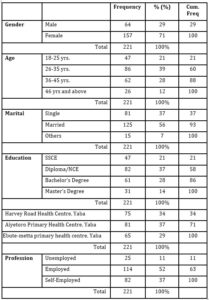
Table 2: Awareness of Social Media for Healthcare information sourcing (n = 221)
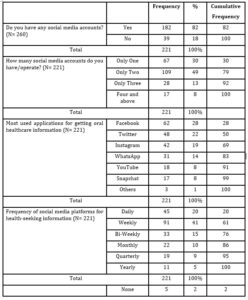
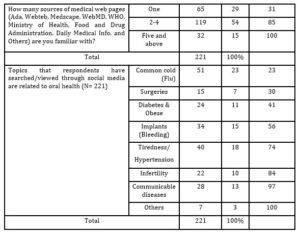
Out of the total 260 respondents for this study, only 221 (85%) participants reported that they have social media account(s). Among the 221 participants, 154 (70%) used at least one type of social media for health-seeking information. The primary reason for seeking consultations on social media may probably be a result of time constraints to visit the physician’s office. Facebook usage was predominant (28%), followed by Twitter (22%), Instagram (19%), and WhatsApp (14%). Approximately 28% (62/221) of the respondents used Facebook; among all social media platforms, Snapshot was the least utilized, implying that the respondents got health-related updates on Facebook and Twitter more often than on other social media platforms.
Considering the frequency of social media for health-seeking information, 45 (20%) respondents claimed that they search to get oral healthcare information on social media platform(s) daily, followed by Weekly and BI-weekly 124 (56%), Monthly 22 (10%), Quarterly 19 (9%), and Yearly 11 (5%). From a list of sources of medical web pages provided in our questionnaire (Ada, Webteb, Medscape, WebMD, WHO, Ministry of Health, Food and Drug Administration, Daily Medical Info, and Others), 216 respondents (98%) were familiar with at least one of them. Lastly, the table indicates the health-related topics that respondents have searched/viewed through social media.
The result shows that the predominant (23%) health-related issue is the common flu (cold, catarrh, fever, headache, congested nose and respiratory tract infection). Others are tiredness/hypertension (18%), infertility (10%), infectious diseases such as missiles, chickenpox, Lassa fever, etc. (13%), implants (bleeding during pregnancy (15%), diabetes and obese (11%), surgeries (7%), and others constitute 3%.
Table 3: Perception of Healthcare information on Social Media (n = 221)
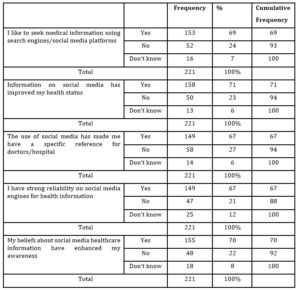
Source: Field survey 2020
Participants’ perception of healthcare information via social media shows in Table 3. Out of 221 participants, 153 (69%) respondents like to seek medical information using search engines/social media platforms. 71% of the participants believed that Information on social media had improved their health status. More so, 67% of the participants indicated that the use of social media has made them have a specific reference for doctors/hospitals. Approximately 67% reported that they have strong reliability on social media engines for health information. Lastly, 74% claimed that their beliefs about social media for healthcare information had enhanced their awareness. By implication, participants often use social media for medical consultations, and more importantly, the online information provided by physicians is useful.
Table 4: Benefits of the Use of Social Media for Seeking Healthcare-Related Information
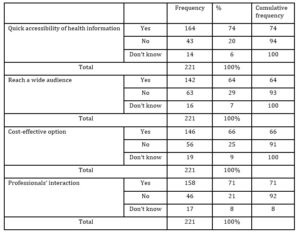
Table 4 provides a clear illustration of the advantages of using social media as a leading source for getting health-related information. The majority of the respondents (74%) stated that quick accessibility and easiness of getting information is the crucial reason for the success of social media. Among 221 respondents, 64% expressed their interest in using social media to communicate and reach a wider audience. 66% of the respondents also affirmed that social media are a cost-effective option for patients. While 71% of the respondents also believed that social media could allow health-related professionals to interact with people and share information effortlessly. In conclusion, the level of online fitness-related information was satisfactory.
Table 5: Benefits of using Social Media to seek Healthcare information
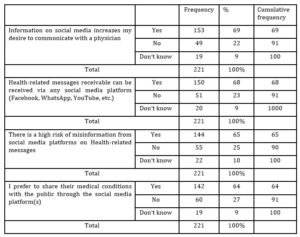
Participants’ awareness and attitude towards social media usage show up in Table 5. Among 221 respondents, 69% expressed that information on social media increases their desire to communicate with a physician, and 38% of the participants indicated that health-related messages are receivable via any social media platform (Facebook, WhatsApp, YouTube, and others). However, 65% of the respondents affirmed that there is a high risk of misinformation from social media platforms on health-related messages; while 64% prefer to share their medical conditions with the public through the Internet.
Table 6: Other Uses of Social Media for Health Information
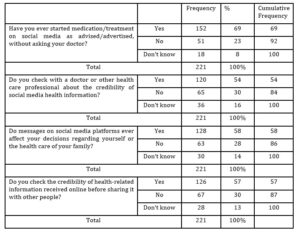
The participants’ other uses of social media usage are presented in Table 6. The majority (69%) of the participants expressed that they start medications/treatment as advised/advertised on social media without asking their doctor. This result bolsters the danger of seeking unverified information on health-related issues via social media. Approximately 54% believe that they verify the credibility of healthcare information on social media with a doctor or other healthcare professionals. In contrast, only 58% claim that social media platform messages ever influence their decisions about themselves or the health care of their family. Ultimately, 57% of the respondents also indicated that before sharing it with other people, they would check the integrity of health information. The number of respondents who check the authenticity of health-related information obtained via social media is, by definition, slightly above average. This finding raises considerable concern.
Summary of Findings and Discussion
This study shows that healthcare information obtained from social media influences the health status of the majority of the participants. Participants of this study believe that the healthcare information available on social media has enhanced their awareness of their health conditions. This finding highlights a significant concern regarding health misinformation and alarming the urgent need for official healthcare social media channels. The results revealed an important fact on the reliability of healthcare information sought by social media users. The safety of information exceeded half of the total number of participants. This striking figure guarantees that healthcare practitioners and policymakers, in addition to social media owners, can help reduce the potential harm of misleading or wrong information transmitted through social media by guiding patients to reputable sites.
It can be concluded based on the information above that social media hold considerable significant value because they allow new ways of accessing information and sharing it. In the current study, more than three-quarters of the participants stated that accessibility and easiness of getting information is the critical reason for the success of social media. This conclusion agrees with research conducted by Tan and Goonawardene (2017) and Song, et al., (2016), which found that participants believed that online social networks could allow health promotion campaigns to share information more easily. Moreover, about half of the participants found communication with oral health professionals as one of the main advantages of using social networks for gaining oral health information. Many researchers, such as Househ, Borycki, & Kushniruk (2014) and Diviani, et al. (2015) affirmed that social media encourage social support, cooperation and participation of the stakeholders concerned and increase the interaction of individuals and allows users to participate directly. Also, the majority of the respondents in the current study found communication difficulty as the main barrier to using social media for getting oral healthcare information followed by credibility and trustfulness which was the second most common barrier to the participants.
Healthcare professionals and policymakers raised concerns regarding the reliability of health-related information found on the Internet and how to make it practical for the public. There is a high risk of misinformation, as healthcare providers are unable to control internet content. However, our findings show that patients are willing to get their news from social media and search engines. Seeking health-related information from social media is both beneficial and disadvantageous, but at the same time results in challenges. Patients report both positive and negative effects. It is essential to identify these effects on healthcare authorities because the ratio of patients using social media for health-related purposes is evolving. Therefore, health professionals will have to deal with the disadvantages and create more awareness of the advantages of using social media to search for healthcare information in suburban centres.
Conclusion and Recommendation
In conclusion, this study shows that social media usage is widespread among patients in Lagos state. The majority used social media platforms to seek health information. The study participants are more likely to search for healthcare information on behalf of family members while a minority received one-to-one medical consultations. Awareness campaigns on the practical use of social media are needed to enhance the knowledge of patients in evaluating the quality of health information, together with proper guidance and education for practitioners. Developing clear policies and guidelines in addition to addressing information accuracy and reliability, perhaps via new technologies by respective governments, might reduce the risk of misleading information.
The results also conclude that social media platforms were useful in helping to make decisions relating to health, while only a few felt otherwise. Most findings from this study were also consistent with previous research work. The advent of social media platforms has transformed people’s health information-seeking behaviour. It is hoped that this study’s findings will help researchers in terms of understanding factors that might influence people’s health-related decision-making, particularly in Nigeria. The study findings will also become a significant contribution to health policymakers and health-related website content regulators. It is consistent with prior research, which discovered that online healthcare information seekers had rated themselves as good or very good in terms of general personal health. However, the frequency of social media use for health-related purposes was every week. This study concluded that health issues/topics sought may vary according to an individual’s preferences. The findings of the previous research revealed that online health seekers had modified the way they take care of their health after having Internet searches and their health-related decision-making.
The results of this study will help guide healthcare practitioners on how to use social media to provide consultations and will also help in developing clear policies and guidelines to reduce misleading information risk. This study shows the need for active healthcare givers who have the right skills to interact with and educate the public using social media.
References
- Abdulaziz, A. (2014), The health-related uses of social media among users in Saudi Arabia. J Med Sci. Public Health; 3: 1492-1497.
- Adelua, M., Odiboh, O., Aiyende, O. and Omokiti, O., (2020a), ‘Community Relations Activities of Tourism, Arts and Culture in Nigeria’, Proceedings of the 35th International Business Information Management Association (IBIMA), ISBN: 978-0-9998551-4-0, 1-2 April 2020, Seville, Spain.
- Adelua, M., Odiboh, O., Nejo, O. and Fayemi, O. (2020b), ‘Public Relations Professionals’ Works at a State Ministry of Tourism, Arts and Culture: A Layout of Viewpoints’, Proceedings of the 35th International Business Information Management Association (IBIMA), ISBN: 978-0-9998551-4-0, 1-2 April 2020, Seville, Spain.
- Adelua, M., Odiboh, O., Olabanjo, J. and Ndubueze, N. (2020c), ‘Banking Public Relations and Customers’ Consciousness in Nigeria’ Proceedings of the 35th International Business Information Management Association (IBIMA), ISBN: 978-0-9998551-4-0, 1-2 April 2020, Seville, Spain.
- Adelua, M., Odiboh, O., Oyedepo, T., Olabanjo, J. and James, D. (2020d), ‘Professional Public Relations in Nigeria’s Banking Industry’ Proceedings of the 35th International Business Information Management Association (IBIMA), ISBN: 978-0-9998551-4-0, 1-2 April 2020, Seville, Spain.
- Aiyende, O., Odiboh, O., Adelua, M. and Omokiti, O. (2020b), ‘Practitioners’ Usage of Electronic Public Relations at A-State Transport Ministry in Nigeria’, Proceedings of the 35th International Business Information Management Association (IBIMA), ISBN: 978-0-9998551-4-0, 1-2 April 2020, Seville, Spain.
- Aiyende, O., Odiboh, O., James, D., and Salau, J. (2020a), ‘Public Awareness and Perception of Electronic Public Relations at The Lagos State Traffic Management Authority, Nigeria’, Proceedings of the 35th International Business Information Management Association (IBIMA), ISBN: 978-0-9998551-4-0, 1-2 April 2020, Seville, Spain.
- Albalawi, Y. and Sixsmith, J. (2015), Identifying Twitter influencer profiles for health promotion in Saudi Arabia. Health Promot. Int.Oct 29; pii. DOI: 10.1093/heapro/dav103
- Almaiman, S., Bahkali, S., Al Farhan, A., Bamuhair, S., Househ, M., and Alsurimi, K. (2015), The prevalence of using social media among healthcare professionals in Saudi Arabia: a pilot study. Stud Health Technol. Inform. 2015; 213:263–266.
- Antheunis, M., Tates, K. and Nieboer, T. (2013), Patients and health professionals’ use of social media in health care: motives, barriers and expectations. Patient Educ. Couns., Sep; 92(3):426–431.
- Bahkali, S., Alkharjy, N., Alowairdy, M., Househ, M., Da’ar, O. and Alsurimi, K. (2015), A social media campaign to promote breastfeeding among Saudi women: a web-based survey study. Stud Health Technol. Inform., 213:247–250.
- Campbell, L., Evans, Y., Pumper, M. and Moreno, M. (2016), Social Media use by physicians: a qualitative study of the new frontier of BMC Med Inform Decision Making, 16(91),
- Coulson, N. (2013), How do online patient support communities affect the experience of inflammatory bowel disease? An online survey. JRSM Short Rep. 2013;4(8)
- Diviani, N. van den Putte, B., Giani, S., and van Weert, J. (2015), Low health literacy and evaluation of online health information: a systematic review of the literature. J Med Internet Res. 2015;17(5): e112.
- Fayemi, O., Odiboh, O., James, D. and Olabanjo, J. (2020a), ‘Public Relations in Secondary Schools: A Case Study of Private and Public Secondary Schools Ota, Nigeria’, Proceedings of the 35th International Business Information Management Association (IBIMA), ISBN: 978-0-9998551-4-0, 1-2 April 2020, Seville, Spain.
- Fayemi, O., Odiboh, O., James, D., and Aiyende, O. (2020b), Professional Public Relations Activations and Tools Used by A-State Development and Property Corporation in Nigeria’, Proceedings of the 35th International Business Information Management Association (IBIMA), ISBN: 978-0-9998551-4-0, 1-2 April 2020, Seville, Spain.
- Fayemi, O., Odiboh, O., Nejo, O. and Salau, J. (2020c), ‘Community Observations of the Public Relations Activations of a State Ministry for Housing in Nigeria’, Proceedings of the 35th International Business Information Management Association (IBIMA), ISBN: 978-0-9998551-4-0, 1-2 April 2020, Seville, Spain.
- Fayemi, O., Odiboh, O., Oyesomi, K., Nwosu, E. and Olabanjo, J. (2020d), ‘Professional Public Relations Practices in High Schools in Nigeria’ Proceedings of the 35th International Business Information Management Association (IBIMA), ISBN: 978-0-9998551-4-0, 1-2 April 2020, Seville, Spain.
- Fernández-Luque, L. and Bau, T. (2015), Health and social media: the perfect storm of information. Inform. Res.; 2: 67-73.
- Grajales, F., Sheps, S., Ho, K., Novak-Lauscher, H. and Eysenbach, (2014), Social media: A review and tutorial of applications in medicine and health care. J Med Internet Res; 16: e13.
- Greaves, F., Pape, U. and King, D. (2012), Associations between Internet-based patient ratings and conventional surveys of patient experience in the English NHS: an observational study. BMJ Qual Saf. 2012;21(7):5. DOI: 10.1136/bmjqs-2012-000906.
- Greaves, F., Ramirez-Cano, D., Millett, C., Darzi, A. and Donaldson, L. (2013), Harnessing the cloud of patient experience: using social media to detect poor quality healthcare. BMJ Qual Saf, Mar;22(3):251–255.
- Greene, J., Choudhry, N., Kilabuk, E. and Shrank, H. (2011), Online social networking by patients with diabetes: a qualitative evaluation of communication with Facebook. Gen Intern Med. 2011 Mar;26(3):287–292.
- Greenhalgh, T., Vijayaraghavan, S., Wharton, J., Shaw, S., Byrne, E., and Campbell-Richards (2016), Virtual online consultations: advantages and limitations (VOCAL) study. BMJ Open; 6: e009388.
- Hao, J. and Gao, B. (2017), Advantages and disadvantages for nurses using social media. J Prim Health Care Gen Pract; 1: 1-3.
- Househ, M., Borycki, E. and Kushniruk, A. (2014), Empowering patients through social media: The benefits and challenges. Health Information Journal; 2014: 20: 50-58.
- James, D., Odiboh, O., Adelua, M., and Fayemi, O. (2020a), ‘Public Awareness and Perception of Public Relations Activations at a Universal Education Board in Nigeria’, Proceedings of the 35th International Business Information Management Association (IBIMA), ISBN: 978-0-9998551-4-0, 1-2 April 2020, Seville, Spain.
- James, D., Odiboh, O., Aiyende, O.and Salau, J. (2020b), ‘Public relations activations in a State Ministry of education, Lagos, Nigeria’, Proceedings of the 35th International Business Information Management Association (IBIMA), ISBN: 978-0-9998551-4-0, 1-2 April 2020, Seville, Spain.
- James, D., Odiboh, O., Nwosu, E. and Fayemi, O. (2020c), ‘Public Relations Practices and Bootlegging in Nigeria’s Publishing Industry: A Focus on STIRLING-HORDEN, HEBN and SAFARI’ Proceedings of the 35th International Business Information Management Association (IBIMA), ISBN: 978-0-9998551-4-0, 1-2 April 2020, Seville, Spain.
- James, D., Odiboh, O., Olabanjo, J. and Adelua, M. (2020d), ‘Publishing, Public Relations and the Public in Ibadan, Nigeria’ Proceedings of the 35th International Business Information Management Association (IBIMA), ISBN: 978-0-9998551-4-0, 1-2 April 2020, Seville, Spain.
- Kear, T., Harrington, M. and Bhattacharya, A. (2015), Partnering with patients using social media to develop a hypertension management instrument. J Am. Soc. Hypertens, Sept. 9(9):725–734.
- Koster, E., Philbert, D., de Vries, T., van Dijk, L. and Bouvy, M. (2015), “I just forget to take it”: asthma self-management needs and preferences in adolescents. J Asthma. Oct;52(8):831–837.
- Laranjo, L., Arguel, A., Neves, A., Gallagher, A., Kaplan, R., Mortimer, N., Mendes, G. and Lau, A. (2015), The influence of social networking sites on health behaviour change: a systematic review and meta-analysis. J Am Med Inform Assoc. 2015 Jan;22(1):243–256.
- Mackey, T., Liang, B. and Strathdee, S. (2013), Digital social media, youth, and nonmedical use of prescription drugs: the need for reform. J Med Internet Res. 2013 Jul 26;15(7): e143.
- Ndubueze, N., Odiboh, O., Adelua, M. and Fayemi, O. (2020), ‘Image Management Through Public Relations in Nigeria’s Food and Beverages Industry’ Proceedings of the 35th International Business Information Management Association (IBIMA), ISBN: 978-0-9998551-4-0, 1-2 April 2020, Seville, Spain.
- Ndubueze, N., Odiboh, O., Nwosu, E. and Olabanjo, J. (2019), Awareness and perception of public relations practices in Public tertiary institutions in Nigeria. Proceedings of the 33rd International Business Information Management Association (IBIMA), ISBN: 978-0-9998551-2-6, 10-11 April 2019, Granada, Spain.
- Nejo, O., Odiboh, O., James, D., and Fayemi, O. (2020a), ‘Public Relations Activities of a State Parks and Gardens Agency in Promoting Environmental Sustainability in Nigeria’, Proceedings of the 35th International Business Information Management Association (IBIMA), ISBN: 978-0-9998551-4-0, 1-2 April 2020, Seville, Spain.
- Nejo, O., Odiboh, O., Omokiti, O., and Adelua, M. (2020b), ‘Awareness and Impact of the Public Relations Activities on a State Ministry of the Environment in Nigeria’, Proceedings of the 35th International Business Information Management Association (IBIMA), ISBN: 978-0-9998551-4-0, 1-2 April 2020, Seville, Spain.
- Nwosu, E. Odiboh, O., Olabanjo, O. and Fayemi, O. (2020a), ‘Made-In-Nigeria Automobile Industry and Public Relations Actions: An Examination of Public Awareness and Perception’ Proceedings of the 35th International Business Information Management Association (IBIMA), ISBN: 978-0-9998551-4-0, 1-2 April 2020, Seville, Spain.
- Nwosu, E., Odiboh, O, Ndubueze, N. and Olabanjo, J. (2019), ‘Public awareness and perception of public relations activities in government agencies in Nigeria’ Proceedings of the 33rd International Business Information Management Association (IBIMA), ISBN: 978-0-9998551-2-6, 10-11 April 2019, Granada, Spain.
- Nwosu, E., Odiboh, O., Oyedepo, T., James, D. and Adelua, M. (2020b), ‘Made-In-Nigeria Automobiles and Public Relations: Three Professionals’ Perspectives’ Proceedings of the 35th International Business Information Management Association (IBIMA), ISBN: 978-0-9998551-4-0, 1-2 April 2020, Seville, Spain.
- Odiboh, O. and Oladunjoye, A. (2019), ‘Application of integrated marketing communication tools for promoting computers in Nigeria’ Proceedings of the 33rd International Business Information Management Association (IBIMA), ISBN: 978-0-9998551-2-6, 10-11 April 2019, Granada, Spain.
- Odiboh, O., Amodu, L. and Ekanem, T. (2020a), ’Marketing and Communication of Herbal Products as Male Reproductive Solutions in Lagos, Nigeria’ Proceedings of the 35th International Business Information Management Association (IBIMA), ISBN: 978-0-9998551-4-0, 1-2 April 2020, Seville, Spain.
- Odiboh, O. and Ajayi, F. (2019), ‘Integrated Marketing communication and carbonated drinks consumers in Nigeria: A consumerist analysis’ Proceedings of the 33rd International Business Information Management Association (IBIMA), ISBN: 978-0-9998551-2-6, 10-11 April 2019, Granada, Spain.
- Odiboh, O., Ezenagu, A. and Okuobeya, V. (2019), ‘Integrated marketing communication tools and facials consumers in Nigeria: Applications and connexions’ Proceedings of the 33rd International Business Information Management Association (IBIMA), ISBN: 978-0-9998551-2-6, 10-11 April 2019, Granada, Spain.
- Odiboh, O., Fasanya, O., Adegoke, K., Afolabi, O. and Ofor, A. (2020b), ‘Social Media in Online Learning among Accounting Business Students in Nigeria: Africa in View’ Proceedings of the 35th International Business Information Management Association (IBIMA), ISBN: 978-0-9998551-4-0, 1-2 April 2020, Seville, Spain.
- Olabanjo, J., Odiboh, O., Adelua, M. and Fayemi, O. (2020a), ‘Activation of public relations by professionals in Nigeria: A case study of Zaron cosmetics and House of Tara’ Proceedings of the 35th International Business Information Management Association (IBIMA), ISBN: 978-0-9998551-4-0, 1-2 April 2020, Seville, Spain.
- Olabanjo, J., Odiboh, O., Nwosu, E. and James, D. (2020b), ‘Piracy in Beauty and Cosmetics Industry and the Application of Public Relations Tools in Nigeria’ Proceedings of the 35th International Business Information Management Association (IBIMA), ISBN: 978-0-9998551-4-0, 1-2 April 2020, Seville, Spain.
- Olabanjo, O., Odiboh, O., Nwosu, E. and Ndubueze, N. (2019), ‘Public relations practices in local government and traditional institutions in Nigeria’ Proceedings of the 33rd International Business Information Management Association (IBIMA), ISBN: 978-0-9998551-2-6, 10-11 April 2019, Granada, Spain.
- Omokiti, O., Odiboh, O., Aiyende, O. and James, D. (2020b), ‘Awareness and Usage of Social Media as e-Public Relations Tool in a Health Ministry and Agency in Nigeria’, Proceedings of the 35th International Business Information Management Association (IBIMA), ISBN: 978-0-9998551-4-0, 1-2 April 2020, Seville, Spain.
- Salau, J., Odiboh, O., Adelua M. and Fayemi., O. (2020a), ‘Farmers On Digital Media Usage and Agricultural Information in Lagos, Nigeria’, Proceedings of the 35th International Business Information Management Association (IBIMA), ISBN: 978-0-9998551-4-0, 1-2 April 2020, Seville, Spain.
- Salau, J., Odiboh, O., Omokiti, O. and Nejo, O. (2020b), ‘Public Relations Practitioners, Poverty Alleviation Programmes for Farmers and State Agricultural Development Authority: A Qualitative Study’, Proceedings of the 35th International Business Information Management Association (IBIMA), ISBN: 978-0-9998551-4-0, 1-2 April 2020, Seville, Spain.
- Sawesi, S., Rashrash, M., Phalakornkule, K., Carpenter, J. and Jones, J. (2016), The impact of information technology on patient engagement and health behaviour change: a systematic review of the literature. JMIR Med Inform. 2016;4(1),
- Shepherd, A., Sanders, C., Doyle, M., and Shaw, J. (2015), Using social media for support and feedback by mental health service users: Thematic analysis of a Twitter conversation. BMC Psychiatry. 2015; 15:29.
- Smailhodzic, E., Hooijsma, W., Boonstra, A. and Langley, D. (2016), Social media use in healthcare: A systematic review of effects on patients and their relationship with healthcare professionals. BMC Health Serv Res; 16: 442.
- Song, H., Omori, K., Kim, J., Tenzek, K., Hawkins, J. and Lin, W. (2016), Trusting social media as a source of health information: online surveys comparing the United States, Korea, and Hong Kong. Med Internet Res. 2016; 18: e25.
- Tan, S. and Goonawardene, N. (2017), Internet health information seeking and the patient-physician relationship: a systematic J Med Internet Res; 2017; 19: e9.
- Tonsaker, T., Bartlett, G. and Trpkov, C. (2014), Healthcare information on the Internet: gold mine or minefield? Can Fam Physician; 60: 407-408.
- Tyrawski, J. and DeAndrea, D. (2015), Pharmaceutical companies and their drugs on social media: a content analysis of drug information on popular social media sites. J Med Internet Res. 2015 Jun 01;17(6): e130.
- Zhang, M., Tran, B., Le, H., Nguyen, H., Nguyen, C. and Tran, T. (2017), Perceptions of health-related information on Facebook: a cross-sectional study among Vietnamese youths. Interact J Med Res; 2017; 6: e16.










